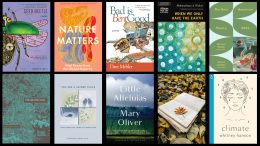“I cannot keep you safe.”
This recurring line in Primeval, Mai Der Vang’s powerful new poetry collection, doesn’t just echo through her book. Similar themes appear through many of this year’s new environmental poetry books. They reflect the fear and frustration we all share about what’s happening to the natural world we love so much.
But love itself is another constant in these books: Love of the Earth, appreciation for wild things and places, and a call to defend it all.
Of course, some of these wild species and places have already been lost, leaving holes in our world and our hearts. That grief also comes out in these poets’ voices.
That’s the collective promise of environmental poetry: It’s a chance to celebrate nature, embrace its magic, mourn what we’ve lost, and remind us to do better.
Here are my reviews of eight powerful new environmental poetry collections published this year. I’ve also included one magazine issue and a new compendium of work by Mary Oliver, the late champion of verse about nature.
This barely scratches the surface of the wide range of environmental poetry books published so far this year, so expect more reviews in the months ahead.
As always, the title of each book links to the publishers’ sites, but you should also be able to find most of these volumes through your local library or bookseller.
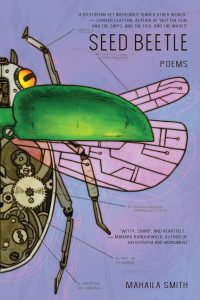
By Mahaila Smith
From the publisher: In a climate changed future, Canada is thought to be a promised land. But in southern Ontario, the promise and the land are exhausted: industrialization has led to widespread destruction, desertification and food insecurity. So when Utopic Robotics promises growth and presents a community with a swarm of automated beetles that will revitalize the land and rebuild utopia, community members rally behind the corporation and its message of hope. But technological solutions often come with secret risks.
Our review: An intense, thought-provoking poetry collection from the future, depicting a 22nd-century world ravaged by climate change, industrialization, Cronenberg-style implants, AI robots, pollution, and other threats. Smith has the byline on the cover, but the book’s unique conceit is that it’s a posthumous collection of poems by a writer who lived through this chaos while seeking love, peace, and family amidst the machinations of a dangerous corporation called Utopic Robotics. It’s high-concept science fiction, but it all feels painfully relevant to today. Easily one of my favorite books of the year. (I enjoyed the electronic review copy so much I bought it in hard copy.)
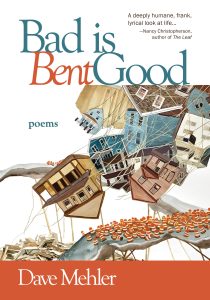
By Dave Mehler
From the publisher: …a deeply immersive, poetic exploration of life working at a landfill in Portland, Oregon.
Our review: One of the poems in this collection is titled “We are daily witness to the world’s wastes.” That sums it up: This is a powerful, revelatory, occasionally infuriating, often disturbing book about what we discard: things, nature, and people. It’s not an easy book. It shines a light on systems most of us would prefer to ignore. We look away at our own peril. Not to be missed.
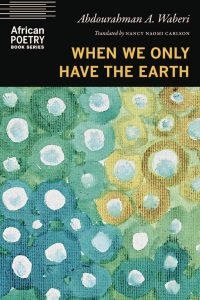
By Abdourahman A. Waberi
Translated by Nancy Naomi Carlson
From the publisher: In this ode to the earth and all its living creatures, French Djiboutian poet, novelist, and essayist Abdourahman A. Waberi sounds the alarm about our imperiled planet… Waberi, a nomad at heart, takes us on a whirlwind tour across North America, Africa, and Europe, daring us to love the earth “beyond all rational thought” and to “turn into earth, both literally and figuratively,” as we “turn from vanity, fears, and other pointless rustling.”
Our review: A short but moving book, full of perspectives we don’t often see, like the casual reference to people rushing out to pour buckets of water on beached whales suffering under the heat of the African sun.

By Mai Der Vang
From the publisher: With profound and attentive care, Vang addresses the plight of the saola, an extremely rare and critically endangered animal native to the Annamite Mountains in Laos and Vietnam… Primordial examines the saola’s relationship to Hmong refugee identity and cosmology and a shared sense of exile, precarity, privacy, and survival. Can a war-torn landscape and memory provide sanctuary, and what are the consequences for our climate, our origins, our ability to belong to a homeland?
Our review: An ode to the rarely seen, critically endangered saola — but so much more. Vang uses the pain and grief from this disappearing species to discuss colonialism, the refugee-immigrant experience (especially as it relates to the Hmong people and her own identity), the Vietnam war, racism, trauma, motherhood, and so much more. The result is a brilliant, haunting poetry collection steeped in conservation issues that also delivers insight into the human experience.
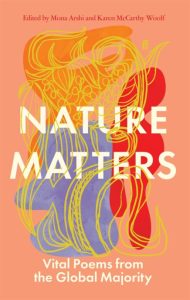
Nature Matters: Vital Poems from the Global Majority
Edited by Mona Arshi and Karen McCarthy Woolf
From the publisher: There has been a welcome surge of nature writing in recent years. Yet this has raised questions as to whose voices are privileged and heard in a space predominantly occupied by Western European traditions and authors…. [Nature Matters] presents brand-new commissions alongside formative works from the past fifty years that invite us to reconsider nature poetry from global-majority perspectives. Image-rich and formally diverse, the poems explore fundamental and ecological themes including climate crisis and the Anthropocene; urban nature, solitude and alienation; protest and radical empathy; Indigenous wisdom and alternative histories.
Our review: An explosion of voices and rich perspectives. This book is going to send me down the rabbit hole to track down more works by dozens of the collected authors.
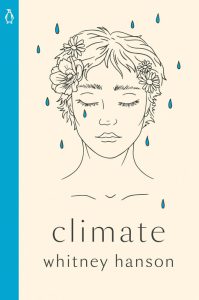
By Whitney Hanson
From the publisher: Honest, poignant, and relatable, Climate is a journey in embracing change both internally and externally. It guides us through all the weather we may face, from the stormy heartbreak to the foggy mental space to the sunny other side…
Our review: This intense, emotional poetry collection isn’t (no matter what the title suggests) about climate change, but it does take its cues from the broader climate: the weather, the seasons, the cultural connections that pull us together and push us apart. It’s about love, loss, the way the rain makes us feel, and the sun (or lack thereof) in our hearts. I wouldn’t call this an environmental book, except the natural world is intrinsically part of the human experience, and Hanson dives into that without restraint.
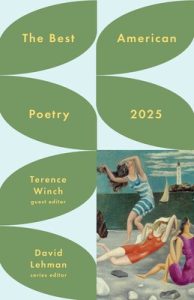
Series Editor: David Lehman; Guest Editor: Terence Winch
Our review: No need to include a publisher’s description this time — the title says it all. As you might guess, this is a wide-ranging anthology, covering a variety of tones, formats, and styles. It’s not strictly an environmental collection, but some elements of nature appear in many if not most of the poems. Sometimes it’s just a brief, poetic mention of magic or grief. Others reflect these crisis-filled times more directly, like “Climate Anxiety” by Patricia Davis-Muffett. The collection feels a bit more Western than Nature Matters (it does focus on American poetry, after all), but every poem lives up to its “best of” designation. (Available Sept. 2, 2025)
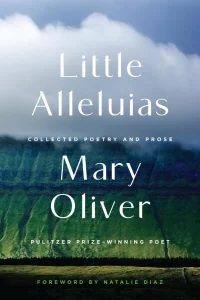
Little Alleluias: Collected Poetry and Prose
By Mary Oliver
Our review: A new compendium of three previously published Mary Oliver books (two volumes of poetry and a third of mostly prose). As you might expect, that makes this triple-worthy of your attention. I’ve read a lot of Oliver over the years, but not these three volumes. I’m grateful for the opportunity to enjoy them back-to-back-to-back. (Available Sept. 9, 2025)
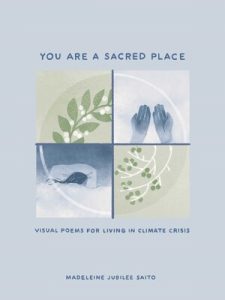
You Are a Sacred Place: Visual Poems for Living in Climate Crisis
By Madeleine Jubilee Saito
From the publisher: Framed as a letter in response to a loved one’s pain, this series of ethereal vignettes takes readers on a journey from seemingly inescapable isolation and despair, through grief and rage, toward the hope of community and connection. Drawing on her faith as well as the tradition of climate justice, Saito reminds readers that if we’re going to challenge fossil fuel capitalism, we must first imagine what lies beyond it: The beauty and joy of a healed world.
Our review: Intense, lovely, and dreamlike, this collection of poems in comics form embraces the pain of fire, flood, and capitalism-driven climate change. More importantly, it crystalizes our collective strife into a call for justice. The book’s 17 poems are presented in a series of painted images, mostly four panels to a page. In addition to the emotional text, the poems use the visuals to set or continue the mood and narrative. Some sequences go on for several pages without a single word — poetry by way of image and imagination. It’s a powerful experience that deserves our attention while it attempts to heal our souls.
Eye to the Telescope issue 57, July 2025
Edited by Maria Schrater
From the publisher: In this issue, birds are enemies and omens, friends and gods, devoured and devouring. The endless diversity of birds is one of the great marvels of our world. Migration patterns, flight mechanics, song, life cycle, and more — it’s a diverse pool to draw from, with deeper potential with the addition of speculative layers.
Our review: Something different to end these reviews: The bird-themed issue of this online magazine published by the Science Fiction and Fantasy Poetry Association. Seventeen authors (and one translator) bring an amazing diversity of tone and structure to these poems, with haunting results. Also check out the April 2025 issue, themed around plants.
That’s it for this month, but you can find hundreds of additional environmental book recommendations, including a few more poetry collections, in the “Revelator Reads” archives.
And let us know what you’re reading: drop us a line at [email protected]

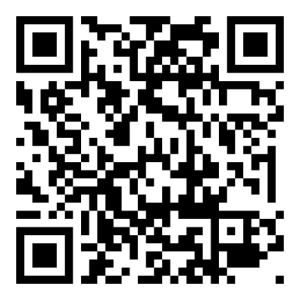
Previously in The Revelator:
Summer of Change: New Books to Inspire Environmental Action

